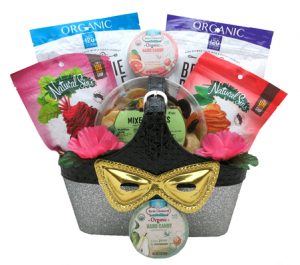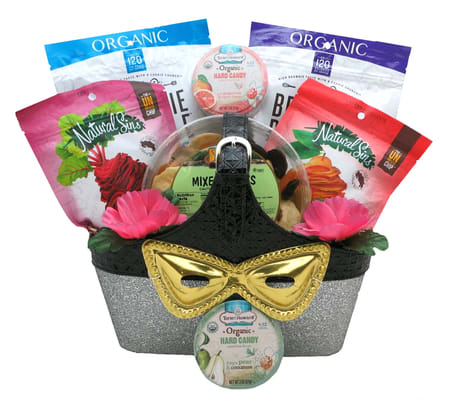It’s officially that time of the year when the P word has begun to enter our minds.
Yes, most of you think I am referring to Pesach and that would apply, as well. For some reason, by Rosh Chodesh Adar, Kosher For Pesach food (in the case of Charleston, canned gefilte fish, matza and potato chips) is already starting to appear in grocery stores, inducing panic that we’re behind, despite the fact that the chag (holiday) is six weeks away.
But in fact, it is not Pesach I am referring to, but Purim. For some reason, just hearing the word “Purim” puts me into avoidance mode and invokes stress even more than Pesach. Yes, Pesach does make me nervous, especially since I live in a place where it’s hard to find a lot of KFP products and I am the one who cooks for our communal seder at the shul. And I do have small kids who traipse crumbs throughout my house (and a 4-year-old who has lately started hiding candy bars in his bed and secretly eats them under his covers), reminiscent of the chuldah (weasel) mentioned in the Mishna which makes Pesach cleaning not so fun. And yet, despite all of the work involved with making Pesach, I find Purim to be more stressful.
What is it, I wonder? I love hearing the Megillah and having the reminder of the salvation Hashem brought when least expected, bearing hope that Hashem will bring us our own personal and collective miracles when we are nearly ready to give up. Matanot l’evyonim– it’s just tzedaka. The meal? We do this every Shabbos. And Mishloach Manot? According to halacha, it’s one package with two snacks.
So what is it that causes me such dread?
And the answer is, it’s the hype. It’s the social expectations that comes along with Purim. The costumes that each child wants, each one wanting to be different from last year and unique. The pressure of feeling like you have to give a Mishloach Manot to each person who gives you. The pressure of creating the cute Mishloach Manot, the poem and picture threading the costume and food items all together.
Obviously there’s nothing wrong with spending creative energies on enjoying the mitzvah and in years gone by, when I had more time on my hands, I used to engage in these creative challenges and enjoy it, as well. I understand that in this Pinterest-y world, this is something people look forward to and enjoy. So aside from laughing at the absurdity that we spend hours preparing baskets of junk food to give to friends, when probably the last thing any friend wants a month before Pesach is more food to get rid of, is there really anything wrong with this Mishloach Manot mania? After all, I can give my one basket with two items and be done. I can do Purim cards (if only I got my act together early enough). Why does it bother me what anyone else does?
I suppose it’s because I wonder to myself, is it nui mitzvah (beautifying a mitzvah) or is it losing sight of the mitzvah and getting caught on the external trappings. I imagine the answer differs for each person.
There’s a concept to get drunk on Purim but only to immerse ourselves more wholly in Torah. Does the Torah part always go together with the drinking? Do we perhaps spend more energy concentrating on the words of the Megillah than we do on the theme of our Mishloach Manot or costumes? And can we honestly say we spend more on Matanot l’Evyonim than we do on Mishloach Manot?
And perhaps what really bothers me is that I sometimes feel this Purim craze is representative of what is happening in some aspects of frum culture.
We cry out the tuition has become unaffordable (and it has) but when we stop to analyze it, has tuition been skyrocketing because of the cost of providing a Jewish education or is it because of the extras us parents want from schools: sports team, clubs, cutting-edge technology, beautiful buildings, multiple educational tracks, enough administrators to always be available to hear our thoughts- everything that a public school or private school generally offers but that has funding to pay for?
Many frum communities have been built around big cities, which usually come along with homes with expensive price tags. This is an unfortunate reality. But even with the struggle of affording the mortgage of these homes, there is the social pressure of building additions, adding nice decor to the outside and redoing the kitchen on the inside.
At yeshivas, it has become so much the norm for families to go away for winter break that a school posted on Facebook asking families to send pictures from Florida, the Bahamas, Israel or other exotic locations they were visiting. And it has become more and more usual for families to go away on expensive Pesach retreats to hotels, rather than going through the toil to make Pesach at home. While there’s nothing wrong with having a nice kitchen, going away for winter break or spending Pesach at a hotel, these should be viewed as extras for those who can afford, they should not become standards for those who can’t afford to feel they need to overextend themselves.
This expensive culture of materialism has seeped into other things as well, with questions such as: how extravagant do bar/bar mitzvahs and weddings really have to be? And a question as basic and simple as: why do we make so much food for Shabbos – fish, meat, chicken and so many sides – does anyone really need that much food? It’s not healthy to eat so much, it’s expensive, so much goes to waste. Do we really do it for Shabbos or do we do it for our company (with the simple test of what do we cook when we are just family)?
When did this culture steeped in materialism and the expenses that come along with it become the frum world? Can we really inspire our children about the truth and beauty of Judaism when sometimes all they see are the superficial trappings, like the elaborate plastic encasing of Mishloach Manot, rather than focusing on the basic two items inside, meant as a gesture of goodwill and friendship?
And so is it a big deal to make a cute themed Mishloach Manot with fancy wrapping? No. But if when we hear “Purim,” that’s what gets us excited (or in my case, stressed), perhaps we need to re-evaluate what’s really important.

The words of this author reflect his/her own opinions and do not necessarily represent the official position of the Orthodox Union.
